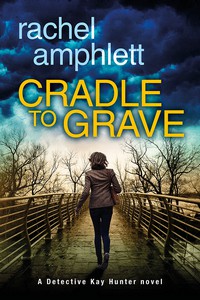

This was my first time reading Rachel Amphlett and I wasn't sure what to expect—I'll cut to the chase now, I really enjoyed it, and Amphlett impressed me from the first chapter on.
The first chapter features some good character moments and a well-drawn figure for characters whose sole purpose is to find a dead body and get the police involved. A lot of authors wouldn't have bothered with making these characters so fleshed-out. Many wouldn't have bothered with showing the discovery of the dead body. I liked this touch.
When the police arrive and look at the dead body, almost impossible to identify, it looks like this could be a long investigation. But one of the instigators notices all the children's belongings in the vicinity and quickly realizes that a child should be at the scene. They have to make a quick decision, do they treat it as a homicide, or a kidnapping. They (wisely) decide to treat it as a kidnapping (while searching for signs of the former). Not only are they hunting for a murderer, they're probably trying to prevent any harm coming to the child.
Not that they'd be taking their time with a murder inquiry, but missing child adds n element of intensity and immediacy to their search for the killer. Which makes the whole novel more tense and fast-paced. As introductions to a series/author go, this was pretty intense.
One thing I appreciate about UK procedurals (in distinction from the US-based) is the trust for the method and procedure. With US procedurals, there's an urgency to an investigation—a strong sense that the longer the investigation takes, the less likely it is that they'll arrest anyone. It feels (at least to me) the opposite with good UK procedurals. There's a trust in the system, that the gears of police work will eventually establish the guilt of someone as long as the gears keep turning. It's almost like they longer things go on, the more certain they are that they'll catch the responsible party. That's certainly the case here, yet, it's well-balanced with the scramble to save the child.
Another thing about UK procedurals is the way the whole team is involved in the investigation—it's not (for example) Det. Bosch, and maybe his partner, barreling through things, with the occasional assist from someone else in the office or a forensic specialist. There are all sorts of officers, of all ranks and assignments running around, making contributions to the overall effort. It's probably a whole lot more realistic, a whole lot more believable—but it comes at a cost. There are so many people running around, that it's hard to keep track of them all, hard to get to the point where you can get a feel for most of the characters—and it's likely that you'll confuse a couple with each other. This isn't a criticism of Amphlett, I've had the same problem when it comes to other UK procedurals that I've read. Maybe it's just me. It just takes a few novels before I can get a feel for anyone beyond the character the series is named after. That's definitely the case here. I have a decent sense for Kay Hunter, and the beginnings of a sense for one or two others on the team, but that's all. Ask me again when book 10 comes around (or if I get to some of the backlist), and that'll disappear.
I did like the characters, and think I could grow to be fans of a few of them—but that'll take time (and the ability to differentiate them easily). I could tell they weren't just interchangeable names, that there were individual characteristics and drives behind them. And none of them served as Detective Exposition or Detective Comic Relief—which is a big plus to me.
Now, when it comes to the witnesses, family of the victims, and suspects? I thought Amphlett did a good job with them all—colorful in the right ways, believable, and did a good job of moving the plot forward (also, police interactions and reaction to the witnesses were handled very nicely).
One thing I truly appreciated about this is just how wrong the police frequently were—and not in little ways, either. Justifiably wrong given the information they had, I should stress. But as soon as they realized they were heading down the wrong path, they quickly fixed it. They didn't spend a few dozen pages in self-recrimination, they didn't get a time-consuming talking to from their superior, or anything like that (although that might be forthcoming...). Instead, they regrouped, shook off the error and acted on the correct information right away. Sure, most procedurals (mystery novels in general) feature some wrong theories, some half-baked notions that have to be discarded. But this seemed to have a larger than usual—and more believable—quantity and quality of errors. But they dealt with them appropriately. I wish I saw more like that.
Was this a perfect book? No, in fact, I was annoyed more than once or twice with either the writing or the plot. But they were all minor annoyances, and nothing worth listing and nothing really took me out of the moment while I read. Better yet, the strengths quickly canceled out the problems/doubts I had. This was a quick, compelling read that did all the right things for a procedural. Entertaining, twisty, and engaging. This won't be my last Amphlett.
My thanks to Tracy Fenton for the invitation to participate in this tour and the materials (including a copy of the novel) provided.

 2
2





